Maryland 2025 Legislative Session: What Social Workers Need to Know and Video Briefing
April 25, 2025 Anita Bryant
Gisele Ferretto, director of public policy at the School of Social Work, explains new social work laws regarding licensure compact, telehealth, and training requirements.
Gisele Ferretto, MSW, LCSW-C, director of public policy at the University of Maryland School of Social Work (UMSSW), provided an overview of key legislative developments from the 2025 state of Maryland session that directly impact social work practice. Watch the video recording.
Key Bills Affecting Social Work Practice
Interstate Social Work Licensure Compact: Maryland joined the National Social Work Licensure Interstate Compact, becoming the 25th state to do so. This compact allows social workers licensed in Maryland to practice across state lines in other participating jurisdictions, increasing license mobility and employment opportunities. It also benefits clients by improving access to care, especially in underserved areas, and enhances continuity of care for clients who travel or relocate, such as college students or military families.
Preserve Telehealth Access Act of 2025: This legislation makes permanent the state’s laws regarding coverage and reimbursement for telehealth services that were set to expire in June 2025. The act ensures ongoing access to telehealth for all health professionals, including social workers, which is critical for equitable access to behavioral health services, crisis intervention, and flexibility for families and caregivers. Telehealth remains a vital tool for social workers, especially post-COVID-19 pandemic.
Health Occupations Structural Racism Training Requirement: House Bill 783 amends the 2021 law requiring implicit bias training by adding a new, one-time requirement for all health professionals, including social workers, to complete structural racism training. This aligns with the profession’s commitment to social justice and anti-oppressive practice. The training will be required upon first license or renewal after April 1, 2026, and must be approved by the state’s Cultural and Linguistic Healthcare Professional Competency Program.
Unpassed Legislation and Ongoing Advocacy: A bill (Senate Bill 379/House Bill 1521) that would have removed the licensing exam requirement for entry-level social workers did not pass. This proposal was in response to national data showing disparities in exam pass rates among racial groups, older adults, and non-native English speakers, highlighting systemic inequities. UMSSW remains committed to advocating for equitable licensing standards.
Implications for Social Work Education and Practice: Ferretto emphasized that these legislative changes require social work education programs to keep curricula current, ensuring that graduates are prepared for evolving practice standards and policy environments. UMSSW is dedicated to teaching ethical, evidence-based practice and advancing policy to address service gaps and improve conditions for individuals and communities.
Next Steps: UMSSW will continue advocacy efforts at the state and national levels to address licensing barriers and promote equitable access to the profession. Social workers are encouraged to stay informed about policy changes, participate in training, and engage in advocacy to support the profession and the communities they serve.